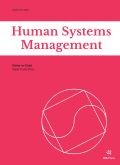Authors: Huang, Hung-Shun | Larbani, Moussa | Yu, Po-Lung
Article Type:
Research Article
Abstract:
Although the concept of identification has been studied and used in many research areas, including psychology, political science, economics, management science, etc., there is no specific quantitative approach. In this article, we propose a quantitative approach to study the identification conception. Specifically, based on the definition of identification sphere of Habitual Domains Theory, we define and explain the concepts of identification function, degree of identification, identification matrices, identification spheres and dis-identification spheres. The quantitative concepts are then applied to formulate the mathematical models of election of a social group leader. The models consider both degree of identification and that of
…dis-identification. Different models lead to different results, which enrich our thinking about election. We also introduce mathematical programming models, utilizing identification matrices, and thresholds of identification, to find an optimal combination of key members to influence all targets in a social group. The results are important for marketing promotion of a new product, service or that of a new concept.
Show more
Keywords: Habitual domains, identification sphere, dis-identification sphere, identification function, identification matrices, social group, election of a leader, marketing promotion
DOI: 10.3233/HSM-2011-0760
Citation: Human Systems Management,
vol. 31, no. 2, pp. 97-109, 2012
Price: EUR 27.50





